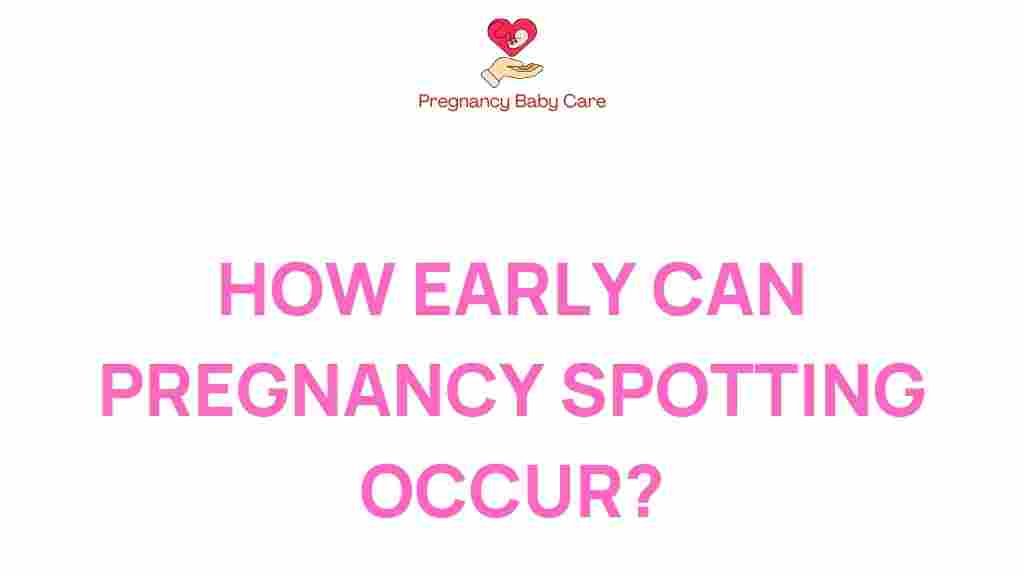Unveiling the Mystery: How Early Can Pregnancy Spotting Occur?
Pregnancy spotting is a common concern for many women as they navigate the early signs of pregnancy. Understanding this phenomenon is crucial for reproductive health and can significantly impact a woman’s health awareness during the pregnancy timeline. In this article, we’ll delve into the various aspects of pregnancy spotting, including when it can occur, how it relates to implantation bleeding, and what symptoms to watch for. Let’s explore how early spotting can be an indicator of pregnancy and what it means for women’s health.
Understanding Pregnancy Spotting
Pregnancy spotting refers to light bleeding that occurs during early pregnancy. It may be alarming for some women, but it is often a normal occurrence. Spotting can happen for various reasons, and recognizing the early signs of pregnancy can help you distinguish between normal spotting and potential complications.
When Does Pregnancy Spotting Occur?
Pregnancy spotting can happen at different times throughout the pregnancy timeline. However, it most commonly occurs around the time of implantation. Here’s a breakdown:
- Implantation Bleeding: This typically occurs 6-12 days after conception when the fertilized egg attaches to the uterine lining. This is often the earliest form of pregnancy spotting.
- Early Pregnancy: Some women may experience spotting in the first few weeks of pregnancy as hormonal changes take place.
- Mid to Late Pregnancy: Spotting can also occur later in pregnancy due to various factors, including cervical changes and sexual intercourse.
Implantation Bleeding vs. Menstrual Period
It’s essential to differentiate between implantation bleeding and a regular menstrual period. Here are some key differences:
- Color: Implantation bleeding is usually light pink or brown, while menstrual blood is typically bright red.
- Flow: Spotting is much lighter and shorter in duration compared to a typical period.
- Timing: Implantation bleeding occurs a week or so before your expected period.
Early Signs of Pregnancy Spotting
Identifying the early signs of pregnancy can help you determine if the spotting is related to pregnancy. Here are some common symptoms:
- Missed Period: One of the most significant early signs of pregnancy.
- Nausea and Vomiting: Often referred to as morning sickness.
- Breast Changes: Tenderness, swelling, or darkening of the areolas.
- Fatigue: Increased tiredness due to hormonal changes.
- Frequent Urination: The need to urinate more often can start early in pregnancy.
What Causes Pregnancy Spotting?
Aside from implantation, several factors can contribute to pregnancy spotting:
- Cervical Changes: The cervix becomes more sensitive and may bleed slightly after intercourse or a pelvic exam.
- Hormonal Fluctuations: Changes in hormone levels during early pregnancy can cause light bleeding.
- Miscarriage or Ectopic Pregnancy: While rare, spotting can indicate a more serious issue, such as a miscarriage or ectopic pregnancy.
When to Seek Medical Attention
While pregnancy spotting is often normal, there are situations when you should consult a healthcare provider:
- If the spotting becomes heavy, similar to a menstrual period.
- If you experience severe cramping or abdominal pain.
- If you notice any tissue or clots passing.
- If you have a history of ectopic pregnancies or miscarriages.
Steps to Take if You Experience Spotting
If you experience spotting during early pregnancy, consider the following steps:
- Monitor the Spotting: Keep track of the color, flow, and duration of the spotting.
- Take a Pregnancy Test: If you suspect pregnancy, taking a home pregnancy test can provide clarity.
- Rest and Relax: Stress can adversely affect your pregnancy; take time to relax.
- Consult Your Doctor: If you have concerns, don’t hesitate to reach out to your healthcare provider.
Health Awareness and Women’s Health
Understanding pregnancy spotting is a vital part of women’s health. Health awareness regarding early signs of pregnancy and reproductive health can empower women to make informed decisions about their bodies. Educational resources and discussions with healthcare professionals can enhance knowledge and preparedness for potential pregnancy complications.
For more information on women’s health topics, check out this helpful resource.
Conclusion
In conclusion, pregnancy spotting can occur early in pregnancy, often as a result of implantation bleeding. Recognizing the early signs of pregnancy and understanding the timeline can help women manage their reproductive health effectively. While spotting can be a normal occurrence, staying aware of your body and seeking medical advice when necessary is crucial for maintaining health during pregnancy.
Always remember, every woman’s experience is unique, and being informed is the first step toward a healthy pregnancy.
For additional insights and to share your experiences, please visit our community forum here.
This article is in the category Pregnancy and created by PregnancyBabyCare Team
